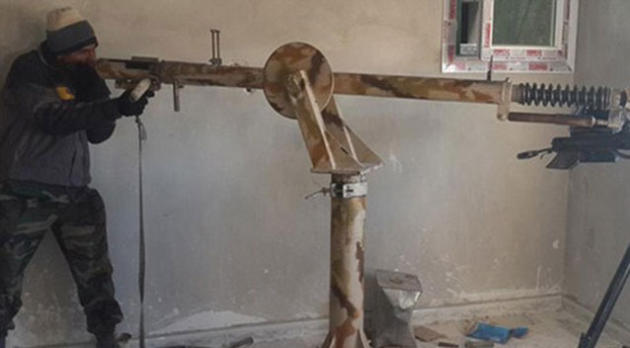
Pictures have emerged of what could be Islamic State terrorists' latest killing machine - a 3m rifle that fires 23mm calibre bullets.
The picture, said to be taken in Kobane, shows that the contraption is so long that it has to be supported by two tripods.
If the rifle works it could fire ammunition that would pierce lightly armoured vehicles.
Firearms expert David Dyson told the mailonline it was unclear how well the weapon is made.
"Is the barrel accurately machined and rifled?
"The effect will also depend on the type of ammunition used. These rounds exist [23mm] fitted with high explosive incendiary or armour piercing incendiary projectiles. They will be effective against personnel and vehicles including lightly armoured ones."
An international coalition including Australia has been formed to stop the IS advance through Iraq and Syria.
US Secretary of State John Kerry has welcomed Iranian military action against IS jihadists in Iraq as "positive" after the Pentagon said Tehran had carried out air strikes against the group.
Kerry, hosting a meeting of an anti-IS coalition in Brussels, said international airstrikes were finally stopping the advance of the jihadists across Iraq and Syria, but warned it could take years to finally defeat them.
But in a sign of the deepening complexity of the regional conflagration, Syria's Iranian-backed President Bashar al-Assad criticised the Western and Arab air strikes for having no effect.
Kerry told the meeting of officials from 60 states in the coalition that a campaign of around 1,000 strikes had had a "significant" impact on the Sunni extremist IS, which declared a caliphate in Syria and Iraq in June.
"Our commitment will most likely be measured in years," he told the meeting at NATO headquarters, adding that the partners would "engage in this campaign for as long as it takes to prevail".
He denied there was any military coordination with Iran, after the Pentagon said earlier that Iranian F-4 Phantom jets -- acquired from the United States before the 1979 Islamic revolution -- had deployed against IS fighters in eastern Iraq's Diyala province.
But he suggested there is an understanding between mainly Shia Iran and the United States to tackle a common threat.
"If Iran is taking on (IS) in some particular place... and it has an impact, then it's going to be net effect (that) is positive," Kerry told a press conference after the meeting.
In Washington, US defence officials said the Iranian air raids were part of a pattern in which Iranian or American military advisers have carved out separate spheres in Iraq.
A defence official said both Tehran and Washington want to avoid confrontations or accidents that could turn into an international crisis.
But the US-led coalition is ready to tolerate Iranian military advisers or aircraft in eastern or southern provinces with large Shiite populations.
"There's a tacit understanding we're not going to operate in the same space. And they're not targeting American forces," the official, who spoke on condition of anonymity, told AFP.
Iran neither confirmed nor denied carrying out any such strikes.
The coalition issued a statement saying that the militant group's "advance across Syria and into Iraq is being halted", and that Iraqi and Kurdish forces were reclaiming territory.
No comments:
Post a Comment